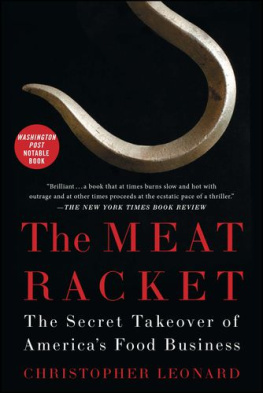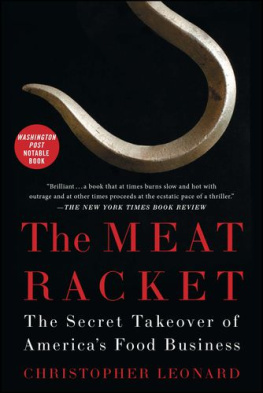ALSO BY CHRISTOPHER LEONARD
The Meat Racket: The Secret Takeover of Americas Food Business

Simon & Schuster
1230 Avenue of the Americas
New York, NY 10020
www.SimonandSchuster.com
Copyright 2019 by Christopher Leonard
All rights reserved, including the right to reproduce this book or portions thereof in any form whatsoever. For information, address Simon & Schuster Subsidiary Rights Department, 1230 Avenue of the Americas, New York, NY 10020.
First Simon & Schuster hardcover edition August 2019
SIMON & SCHUSTER and colophon are registered trademarks of Simon & Schuster, Inc.
For information about special discounts for bulk purchases, please contact Simon & Schuster Special Sales at 1-866-506-1949 or .
The Simon & Schuster Speakers Bureau can bring authors to your live event. For more information or to book an event, contact the Simon & Schuster Speakers Bureau at 1-866-248-3049 or visit our website at www.simonspeakers.com.
Jacket design by Alison Forner
Library of Congress Cataloging-in-Publication Data is available.
ISBN 978-1-4767-7538-8
ISBN 978-1-4767-7540-1 (ebook)
This book is for my mother, Victoria Brigham Leonard, who taught me to think about the other person. Thank you.
PREFACE
The Fighter
(19672019)
On May 18, 1981, four Wall Street bankers traveled to Wichita, Kansas. They went there to make an offer to Charles Koch, the CEO of an obscure, midsize energy company. The bankers, from Morgan Stanley, wanted to convince Koch to take his familys company public, offering shares for sale on the New York Stock Exchange. Their deal was squarely in line with the conventional wisdom of corporate America at the time. Going public was seen as a natural progression for companies like Koch Industries, offering them access to big pools of money and promising enormous paydays for the existing team of executives. All it required from the CEO was to surrender control. Morgan Stanley, in return, would collect a small fortune in fees.
Charles Koch was forty-five years old. He had run Koch Industries since he was thirty-two, when his father died suddenly. He was trim, tall, and had an athletes build. He spoke quietly in meetings and seemed almost passive. The bankers laid out their plan to take Koch public. They revealed what, to most executives, at least, might have been the most significant detail: if Charles Koch agreed to the deal, he could earn $20 million overnight. The bankers seemed incredulous when they prepared a confidential memo about Kochs reaction.
He does not want this cash, the memo reported.
Charles Koch calmly explained to them why their offer made no sense. His company was breathtakingly profitable. It operated in vital, deeply complex corners of the American energy industry. During the 1980s, Koch Industries was the largest purchaser and transporter of US crude oil. It owned an oil refinery. It employed teams of commodities traders who bought and sold a wildly diverse menu of raw materials and financial products, from gasoline to paper futures contracts. This might have encouraged most CEOs to take their company public. Koch Industries, however, did not want outsiders to know how much money its traders were earning. Taking the company public would expose too many of its secrets.
Certain of [Kochs] commodity traders are particularly worried that their high salaries, once disclosed to the public, would be used against them by their trading partners, the memo said.
Secrecy was a strategic necessity for Koch Industries. Charles Koch did not want to surrender it. He also didnt want to surrender control. He had a specific, clear vision of how to run his company, and he didnt need Wall Street investors to interfere.
If the bankers expected Charles Koch to go along with the conventional wisdom of their time, then they, like so many outsiders, did not understand him. Beneath his low-key veneer, Charles Koch was, at his core, a fighter. He had unmovable ideas about how things should be, and he did not back down when challenged. When he was challenged by his own brothers for control of Koch Industries, he fought them in a bitter legal battle that lasted decades. When he was challenged by members of a powerful labor union during his first years as CEO, he fought them even as they committed an act of industrial sabotage that nearly destroyed Kochs oil refinery. When the FBI and the US Department of Justice launched a criminal investigation into Koch Industries oil gathering business, Charles Koch fought them with every legal and political tool at his disposal. When a liberal Congress and President Barack Obama sought to impose regulations on the fossil fuel industry to control greenhouse gas emissions, Charles Koch fought them in ways that changed US politics.
In each of these fights, Charles Koch prevailed.
When Charles Koch dismissed the bankers in 1981, it was just a small skirmish in the larger war to control Koch Industries. After prevailing in that fight, he created a company that was true to his vision. He avoided the snares that entangled many publicly traded companies that report their financial results to investors every three months. Koch Industries didnt have to think quarter to quarter. The company thinks year to year. An internal think tank and deal-making committee, called the development group, will sometimes think through a business deal on a timeline measured in decades. This long-term view made Koch nimble where other companies stumbled. In 2003, for example, Koch Industries bought a group of money-losing fertilizer plants when no publicly traded company was willing to take the risk. Today those plants are as profitable as a broken ATM machine that spews out cash around the clock. Unlike publicly traded companies, Koch Industries does not pay out rich dividends to investors. Charles Koch insists on reinvesting at least 90 percent of the companys profits, fueling its constant expansion.
This strategy laid the foundation for decades of continuous growth. Koch Industries expanded continuously by purchasing other companies and branching out into new industries. It specialized in the kind of businesses that are indispensable to modern civilization but which most consumers never directly encounter. The company is embedded in the hidden infrastructure of everyday life. Millions of people use Kochs products without ever seeing Kochs name attached. Koch refines and distributes fossil fuels, from gasoline to jet fuel, on which the global economy is dependent. Koch is the worlds third largest producer of nitrogen fertilizer, which is the cornerstone of the modern food system. Koch makes the synthetic materials used in baby diapers, waistbands, and carpets. It makes the chemicals used for plastic bottles and pipes. It owns Georgia-Pacific, which makes the wall panels, beams, and plywood required to build homes and office buildings. It makes napkins, paper towels, stationery, newspaper, and personal hygiene products. Koch Industries owns a network of commodities trading offices in Houston, Moscow, Geneva, and elsewhere, which are the circulatory system of modern finance. Koch traders sell everything from fertilizer, to rare metals, to fuel, to abstract derivatives contracts. Koch Industries annual revenue is larger than that of Facebook, Goldman Sachs, and US Steel combined.
The profits from Kochs activities are stunning. Charles Koch and his brother David own roughly 80 percent of Koch Industries. Together the two men are worth $120 billion. Their fortune is larger than that of Amazon CEO Jeff Bezos, or Microsoft founder Bill Gates. Yet David and Charles Koch did not invent a major new product or revolutionize any industry. The Koch brothers derived their wealth through a patient, long-term strategy of seizing opportunities in complex and often opaque corners of the economic system.
Next page









